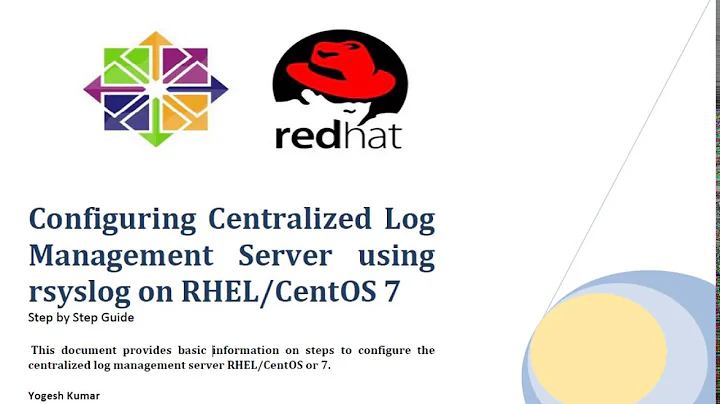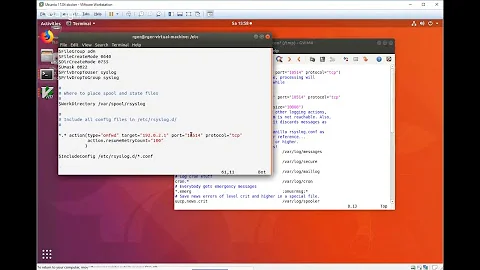syslog ip ranges to specific files using `rsyslog`
Solution 1
rsyslogd Configuration
In /etc/rsyslogd.conf
# provides remote UDP syslog reception
$ModLoad imudp
$UDPServerRun 514
# If logging to an NFS mount, use these settings...
# "OMFileFlushOnTXEnd off" avoids fsync on every write...
# mount -o hard,rsize=32768,wsize=32768,noacl,noatime,nodiratime -t nfs
$OMFileIOBufferSize 768k
$OMFileAsyncWriting on
$OMFileFlushOnTXEnd off
$OMFileFlushInterval 10
$MainMsgQueueSize 100000
# kill all INTF-FLAP messages...
if $msg contains 'INTF-FLAP' then /dev/null
&~
## Cisco ACS Accounting...
if ($fromhost-ip=='172.17.16.20') and ($programname == 'CSCOacs_TACACS_Accounting') then /var/log/tacacs_acct.log
&~
## CiscoACS 5.4 TACACS Authentication
if ($fromhost-ip=='172.17.16.20') and ($programname == 'CSCOacs_Passed_Authentications') then /var/log/tacacs_auth.log
&~
# Logging for Chicago issues...
if $fromhost-ip startswith '172.17.25' then /var/log/net/chicago.log
& ~
# Logging for Dallas issues...
if $fromhost-ip startswith '172.17.27' then /var/log/net/dallas.log
& ~
# Logging for firewall...
if $fromhost-ip=='172.17.4.4' then @10.14.12.12
if $fromhost-ip=='172.17.4.4' then /var/log/net/firewall.log
& ~
Each of the &~ entries prevents fall-through to the rest of the rsyslog.conf configuration; thus I won't see router syslog entries in /var/log/messages.
Touch all syslog files:
touch /var/log/net/chicago.logtouch /var/log/net/dallas.logtouch /var/log/net/firewall.log
Restart rsyslogd with /etc/init.d/rsyslogd restart
Log rotation
In /etc/logrotate.d/rsyslog
/var/log/net/*.log
{
copytruncate
rotate 30
daily
missingok
dateext
notifempty
delaycompress
create root 664 root root
compress
maxage 31
sharedscripts
lastaction
# RHEL: Use "/sbin/service rsyslog restart"
# Debian / Ubuntu: Use "invoke-rc.d rsyslog reload > /dev/null"
invoke-rc.d rsyslog reload > /dev/null
endscript
}
Solution 2
Also, I found this on the rsyslog wiki that could serve as future refernce for someone.
http://www.rsyslog.com/storing-messages-from-a-remote-system-into-a-specific-file/
Related videos on Youtube
Comments
-
 Mike Pennington over 1 year
Mike Pennington over 1 yearI have many Cisco / JunOS routers and switches that send logs to my Debian server, which uses
rsyslogd.How can I configure
rsyslogdto send these router / switch logs to a specific file, based on their source IP address? I do not want to pollute general system logs with these entries.For instance:
- all routers in Chicago (source ip block: 172.17.25.0/24) to only log to
/var/log/net/chicago.log. - all routers in Dallas (source ip block 172.17.27.0/24) to only log to
/var/log/net/dallas.log. - Delete all
APF-3-RCV_UNSUPP_MSGmessages without logging them - Send logs for 172.17.4.4 to a file named
/var/log/net/firewall.log - Forward firewall logs to 10.14.12.12 using UDP port 514
Finally, these logs should be rotated daily for up to 30 days and compressed.
NOTE: I am answering my own question - all routers in Chicago (source ip block: 172.17.25.0/24) to only log to
-
Qiang Xu almost 4 yearsIs there a way for an external program, like a python script, to read the value of
$fromhost-ipfor each log entry received byrsyslogd? The purpose here is to determine if the log entry comes from a certain ip address. -
 Mike Pennington almost 4 yearsThe first thing that comes to mind is to ensure you save
Mike Pennington almost 4 yearsThe first thing that comes to mind is to ensure you save$fromhost-ipin your rsyslog lines and then parse$fromhost-ipout as your python script reads each log file line by line -
Qiang Xu almost 4 yearsThanks, Mike. This is good advice. I'll have to look at
/etc/rsyslogd.confto make sure$fromhost-ipis contained in the log message template.




